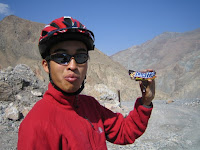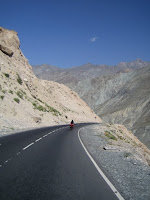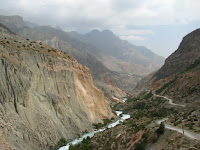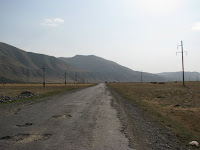While cycling out of Dushanbe, we probably passed 40 police officers on the road (every 300 m one officer). Surprisingly nobody stopped us. Obviously a tourist on a bicycle makes a difference from a tourist in a jeep.
The road to Ayni was in perfect conditions. Cycling was easy but it was permanent climbing. During a descend I nearly had my first accident. A crazy cat ran with full speed across the road into my front wheel. Luckily I did not fall.
On the way there were several dark tunnels. We didn't dare to cycle through (we had read too many horror stories about these tunnels before), so we pushed the bicycles on the 'pedestrian' lane. There was never light and too many trucks were on the road. Behind one of the tunnels we decided to stay overnight.
The next morning it was time to tackle the Anzob pass (3000 m and something) that was on the way to Ayni. There were two options. Either we could have taken the famous Anzob tunnel or the high Anzob pass. We had read a lot about the the Anzob tunnel, that is between 4 and 6 km long. Although opened only some years ago it is supposed to be in very bad conditions, a no-go for cyclists. So we decided to take the pass. At the junction to the Anzob pass we were turning towards the road to the pass, when the police officer stopped us. He wanted us to go through the tunnel. We tried to explain that the tunnel was too dangerous for us but he didn't understand or didn't want to. When we pointed on our bicycles and said 'no tunnel, pass', he looked at the bicycles and said that they were good enough for the tunnel. We pedaled away some meters and stopped again to discuss what to do. A Russian truck passed by, stopped and the two men offered to take us through the tunnel. There was no long discussion. This was the only way to get through the tunnel.
The two Russian truck drivers didn't speak English. Conversation was difficult but very funny. Sarah - not knowing the Russian word for Chinese - explained my origin like this 'papa, mama, Jackie Chan'. They did understand! We didn't know how many kilometers were between the junction with the police checkpoint and the Anzob tunnel. While we were driving to the tunnel, we only then noticed that it would have been a long, hard climb with many short tunnels and a lot of truck traffic. We were happy with the truck solution. Especially when we saw the tunnel, we were even happier. The tunnel was pure horror! Long, dark, deep potholes, flooded, no ventilation system, too dangerous! I would have loved to see that police officer cycling through the tunnel.
Right after the tunnel we said good-bye to the nice truck drivers. When the truck was gone, I suddenly noticed that I had left my helmet in the truck. Again! I started the long descend without any helmet. Several kilometers later my hope became true. We saw the truck and I got my helmet back. Camera, clothes and helmet! We got them all back.
Our destination for Wednesday was Iskander Kul lake, 24 km off the main road to Ayni. During our climb to the lake, we met three Brits on their bicycles. They kicked off in Tashkent and were on the way to India. Basically they came from Tashkent via Samarkand where we want to go to. We exchanged some valuable information about the road conditions, hostels and border crossing. Iskander Kul was a great place. We could camp right at the lake. It was the best place to relax from the tiring climb, so we stayed two nights in the end and visited an impressive waterfall on our rest day. The place didn't have any shower though. On the second day we ran out of food. The 'restaurant' at the lake was a joke (so did other cyclists confirm who we met in Samarkand). It took them 2 hours to prepare simple fried potatoes with onions, which weren't even good at the end.
On Friday we cycled from Iskander Kul to Ayni. We stayed in the hotel of the 'Deutsche Welthungerhilfe' and hoped to meet some German speaking people who could have told us about the organisation and what exactly they do in the region. Unfortunately nobody spoke German or English. What a pity. We stocked up in Ayni before we continued to Pendjikent on Saturday.
The distance between Ayni and Pendjikent was 93 km and our hope was to get there in one long day. However, the road during the first 45 km was so bad that we had to stop in Kistutdak for one night. I asked for a hotel in a shop but there was no hotel in Kistutdak. The shop filled up quickly with locals who wanted to see us tourists. A boy led us from that shop to a different shop that had an empty room in the backyard where we could sleep. The shop was owned by Nacia's family. We didn't know what to think of him. On the one hand he was a friendly host, but on the other hand he ignored us when we tried to buy water and food in his shop and got quite annoyed when we didn't understand his Russian. His wife prepared dinner (Plov of course) and we had dinner altogether. They had 7 children, although his wife was only 32 years old! He asked us how many children we had. We will never forget his surprised face when he heard that we had none. Awesome!
The people in the Fan Mountains were very friendly. Kids started running like crazy when they saw us. We heard 'hello' from everywhere. We have never heard so many 'hellos' in such a short time in our life.
After breakfast we continued to Pendjikent. The road was so much better and we cycled the remaining 48 km in about 3 hours time.We rolled into Pendjikent before noon and the heat. From Pendjikent it is only about 20 km to the Uzbek border. In the bazaar we exchanged our remaining Tajik Somoni against Uzbek Sum. For 500 Tajik Somoni (about 112 USD) we got 238000 Uzbek Sum. The amount of Sum bills was overwhelming. The biggest bill is 1000 Sum. You can imagine how many bills we had in our hands.





































